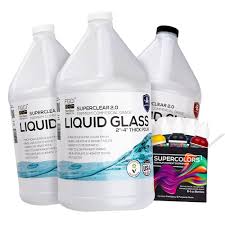Exploring the Wonders of Liquid Glass Technology

Introduction to Liquid Glass
Liquid glass, scientifically known as sodium silicate, has gained significant attention in various sectors due to its unique properties and versatility. This remarkable material serves as a protective coating, sealant, and even an ingredient in numerous applications across industries. Its relevance has surged, particularly in the wake of growing environmental concerns and the need for sustainable solutions.
What is Liquid Glass?
Liquid glass is a compound containing silica and sodium oxide, which when mixed with water forms a viscous solution. This mixture can be applied to surfaces to create a strong, glass-like coating that is both waterproof and resistant to high temperatures. It is often utilized in construction, electronics, and household cleaning products, showcasing its diverse capabilities.
Recent Developments in Liquid Glass Technology
Recent advancements have expanded the scope of liquid glass applications. In construction, for instance, liquid glass is being used to enhance the durability and lifespan of concrete by creating a protective barrier against moisture and chemicals. This ability significantly reduces the maintenance costs associated with conventional building materials.
Additionally, the electronics industry is exploring the use of liquid glass in the production of touchscreen devices. Researchers have found that integrating liquid glass can enhance the scratch resistance of screens, thereby improving product durability in consumer electronics.
Environmental Impact and Sustainability
With rising awareness about environmental sustainability, liquid glass presents a promising alternative to traditional coatings and sealants that often contain harmful chemicals. Its non-toxic nature makes it an attractive choice for applications in food packaging, where safety and cleanliness are paramount.
Conclusion: The Future of Liquid Glass
The future of liquid glass is bright, with growing interest from various sectors due to its multifunctionality and eco-friendly benefits. As technology evolves, further innovations are likely to emerge, enhancing its application range and effectiveness. For consumers and industries alike, liquid glass not only represents a leap in material science but also stands as a symbol for a greener, more sustainable approach to technology and manufacturing.







